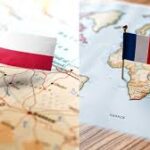President Tinubu’s Frequent Trips to France: Implications for Nigeria
Since assuming office on May 29, 2023, President Bola Ahmed Tinubu has made multiple trips to France, sparking both praise and criticism. By April 5, 2025, he has visited France at least seven times as president, with additional visits prior to his inauguration, totaling nine since March 2023. These trips—ranging from official state visits to private and “working” engagements—have raised questions about their purpose, cost, and broader implications for Nigeria. While the presidency touts economic and diplomatic gains, critics highlight concerns over transparency, governance, and national sovereignty amid Nigeria’s pressing domestic challenges.
The Frequency and Context of Tinubu’s France Visits
Tinubu’s trips to France began shortly after his election, with a notable visit in March 2023 for medical treatment following a grueling campaign. As president, his first international trip was to Paris in June 2023 for the New Global Financing Pact Summit. Subsequent visits include a private trip in January 2024, a state visit in November 2024 yielding $300 million in deals, and a two-week “working visit” in April 2025. Other trips, such as those in August 2024 and late 2023, have been less detailed, often labeled as private or brief work stays. Collectively, he has spent over 165 days abroad across 18 countries in less than two years, with France being the most frequent destination.
The official narrative frames these visits as strategic. Nigeria is France’s top sub-Saharan trade partner, with bilateral trade exceeding $5 billion in 2023. The November 2024 state visit, hosted by President Emmanuel Macron, resulted in agreements for infrastructure, renewable energy, agriculture, and health care, alongside banking expansions by Zenith and UBA into France. Tinubu has emphasized Nigeria’s openness for business, aligning with his “Renewed Hope Agenda” to attract foreign investment and bolster an economy strained by inflation, currency devaluation, and a cost-of-living crisis.
Positive Implications for Nigeria
- Economic Gains: The $300 million investment pact from November 2024 targets critical sectors, potentially creating jobs and improving infrastructure. France’s expertise in energy and agriculture could help address Nigeria’s food security and power challenges. Tinubu’s meetings with global leaders, including Macron, signal Nigeria’s intent to deepen economic ties, as evidenced by a reported $23.11 billion increase in foreign exchange reserves since 2023.
- Diplomatic Leverage: The visits reinforce Nigeria’s global standing, particularly as Tinubu seeks a permanent UN Security Council seat. Amid France’s waning influence in the Sahel due to anti-French sentiment and coups, Nigeria emerges as a stable partner, potentially positioning it as a gateway for France into Africa. This aligns with Tinubu’s 4-D foreign policy (Democracy, Development, Demography, Diaspora), enhancing Nigeria’s regional influence as ECOWAS chair.
- Strategic Alliances: Beyond economics, Tinubu has stressed security cooperation, notably in combating terrorism and migration challenges in the Gulf of Guinea and Sahel. France’s military and intelligence resources could bolster Nigeria’s fight against Boko Haram and banditry, complementing existing partnerships with the US and UK.
Negative Implications and Criticisms
- Transparency and Health Concerns: The opacity surrounding many trips—particularly those labeled “private”—has fueled speculation about Tinubu’s health. Critics, including activist Omoyele Sowore, allege these are medical visits disguised as official engagements, pointing to his pre-inauguration treatment in France and a viral video in March 2025 showing apparent health struggles. This lack of clarity erodes public trust, especially given Nigeria’s history of leaders concealing medical conditions.
- Economic Cost Amid Crisis: With Nigeria grappling with 34.2% inflation (as of early 2025 estimates) and over 129 million people below the poverty line, the cost of Tinubu’s travels—estimated at over N83 billion ($50 million) in 2024 alone—draws ire. The purchase of a $100 million Airbus A330 jet in 2024, used for a France trip, exemplifies perceived extravagance when citizens face fuel scarcity and soaring food prices. Opposition figures like Atiku Abubakar have branded Tinubu a “tourist-in-chief,” arguing his absence neglects domestic priorities.
- Sovereignty and Neo-Colonial Fears: Frequent engagement with France, a former colonial power losing ground in Africa, raises concerns about Nigeria’s autonomy. Some see Tinubu as overly reliant on Macron, fearing a “puppet” dynamic that could prioritize French interests—such as resource extraction—over Nigeria’s. This is heightened by France’s controversial history in the Sahel, where critics argue its partnerships have perpetuated poverty and insecurity.
- Leadership Vacuum: The simultaneous absence of Tinubu and Vice President Kashim Shettima on foreign trips (e.g., April 2025) has sparked outrage from groups like the PDP and NNPP, who claim it leaves Nigeria on “autopilot.” With insecurity escalating—over 10,000 killed in conflicts since 2023—and economic reforms like fuel subsidy removal stoking unrest, critics argue Tinubu’s physical presence is essential for effective governance.
Balancing the Narrative
The presidency defends these trips as vital for investment and diplomacy, asserting that modern governance transcends physical presence with digital tools. Minister of Foreign Affairs Yusuf Tuggar has claimed Nigeria can afford them, citing long-term benefits over short-term costs. However, this justification struggles against public sentiment. While economic deals are tangible, their trickle-down impact remains unproven amid ongoing hardship. The health speculation, if true, underscores a need for succession planning, yet no power transmission to Shettima has occurred, testing constitutional limits.
Conclusion: A Double-Edged Sword
President Tinubu’s constant trips to France embody a high-stakes gamble. They offer Nigeria a chance to leverage global partnerships for development, potentially stabilizing its economy and security. Yet, they risk alienating a populace desperate for transparency, accountability, and domestic focus. The implications hinge on execution: if investments materialize into visible progress, the trips could be vindicated. If not, they may cement perceptions of a disconnected leader, deepening Nigeria’s crises and straining its sovereignty. For now, the jury remains out, but the clock is ticking on Tinubu’s ability to prove the payoff outweighs the price.







